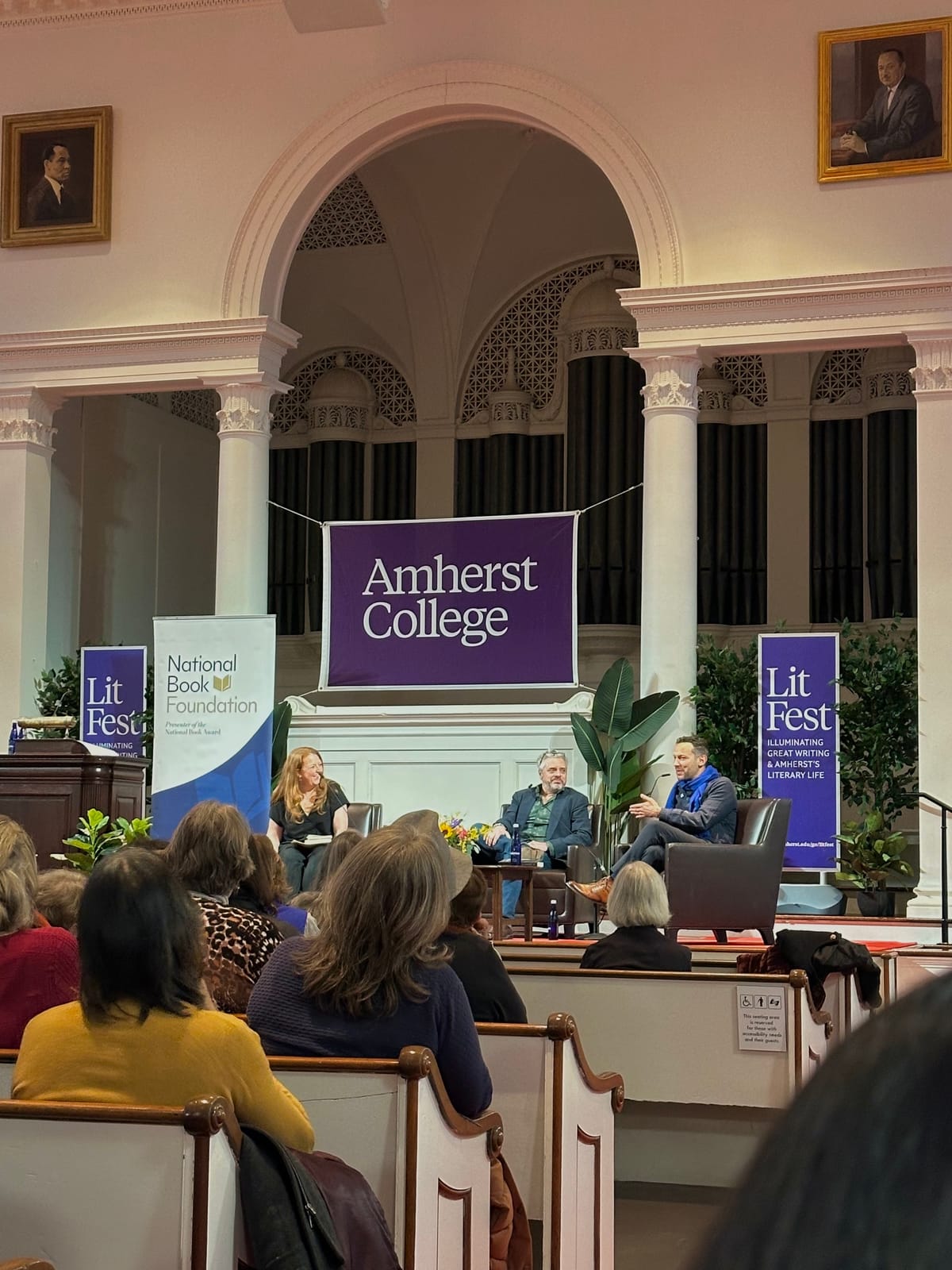Justin Torres and Paul Harding Launch LitFest
Acclaimed authors Justin Torres and Paul Harding kicked off LitFest 2024 with a discussion of craft, historical inspirations, and transcending reality. Davis Rennella ’24 details the lively conversation and the pair’s advice for aspiring writers.

On Friday, Feb. 23rd, Amherst College kicked off the ninth annual LitFest by welcoming novelists Justin Torres and Paul Harding to Johnson Chapel. The pair discussed their newest books with English Professor Amelia Worsley. As Harding previously taught Torres, their writing works in conversation with each other; the books they introduced were akin in their themes and methods of composition. Torres and Harding discussed the inspirations for their stories, the particular methods of their craft, and gave advice for young writers who wish to develop into great storytellers.
Justin Torres discussed his 2023 novel “Blackouts,” which follows an unnamed young man talking with his elderly friend Juan who is on his deathbed. As two queer men, they spend much of their time in the novel telling each other stories and exploring their personal histories that have often been ignored or obscured by the rest of the world. There isn’t much of a plot, Torres revealed, and the story is largely told through vignettes which connect to one another through the characters making associations between them. One of the stories that the characters discuss is that of a real-life book called “Sex Variants: A Study of Homosexual Patterns,” which was a detailed survey of the lives of 40 homosexual men and women in the 1930s. Torres initially encountered this book when a box of books arrived from a deceased person’s house to the bookstore he worked at. Published against the background of the era of eugenics in the United States, the study has undertones of pathologization and presents homosexuals as sometimes beautiful, and sometimes unnatural. Torres’s characters mull on these concerns over the course of the novel and how they relate to their own identities as queer people.
At the panel, Paul Harding also introduced his 2023 book “This Other Eden.” The book examines another marginalized group — a rare interracial community based on Malaga Island in Maine that existed from the late 1700s until the 1910s. While its origins were unclear, the community met its end when the U.S. government forcibly evicted all the inhabitants in 1912 and sent many of them to various mental institutions, again invoking the US’ history of eugenics. Harding explained that his primary inspiration for the story were historical photographs of the community whose evocative power alone gave him an emotional link to the island and moved him to explore it through writing. In his book, Paul wanted the reader to get close to the trauma the people of the colony suffered with an immediacy and inevitability that reading a historical account cannot. In deciding which events to focus on, he didn’t want to simply re-subject these people to violence they had already endured, nor simply preach about the wrongness of the eviction. The result is a story where the people of the island are forced to reckon with their changing circumstances and the reasons why their former paradise is crumbling around them.
Although both authors based their work on real-world histories, their novels include imagery and references that bring their stories out of the realm of historical fiction and into literary imagination. The dying man in Torres’ “Blackouts,” for example, isn’t in a hospital, but an imaginary structure called “The Palace” which lies in a place adrift from normal time and space. Torres wanted the reader to feel as though they were “stepping off the world” when entering his story, while still remembering the real world from which they came.
Harding is also enthusiastic about blending other sources of literature and art from different places and eras into his work. He imagines what scant literature might be present in a cabin in rural Maine in the 1910s — The Bible and perhaps Shakespeare — and inserts elements of each into the novel. His book begins with an older woman telling her grandchildren about their origin story, a kind of Genesis complete with pages and pages describing a sort of biblical flood. And like Shakespeare’s plays, the shifting focus of the story ends up causing certain characters to disappear without a trace partway through.
After the talk proper had concluded, Professor Worsley shared questions from the audience. When asked to provide advice for students interested in a career in creative writing, Torres reflected on his process of writing “Blackouts” and revealed he sometimes struggles with writing from a place of anger, conveying resentments that could (and did) impact his family. He encouraged people to write about painful topics without surrendering entirely to their resentment. For Harding, meaningful art is not produced when written from a place of polarized indignation or vengefulness, no matter how justified those feelings might be.
In the Q&A, Harding encouraged the audience to fully immerse themselves in the writing process and to not take their professors’ advice for granted. He noted that self-consciousness can create a roadblock but can eventually turn into self-awareness that makes for stronger writing. Harding also reminded the audience why anyone takes up creative writing in the first place: to create great works of art. Don’t settle for writing something passable but forgettable – create your own voice, and don’t be embarrassed that you might affect someone deeply with your writing. In short, “Write the book that no one else can write.”





Comments ()